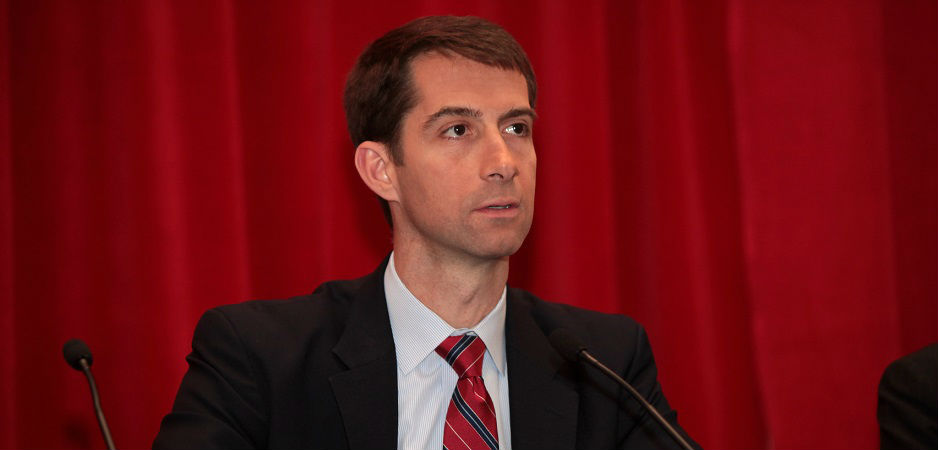Republican senators in the US and hard-line mullahs in Iran have made common cause against prospects of peace.
Who would have imagined that clean cut white Christians in the US Senate would hop into bed with hard-line bearded Shiite mullahs in Iran? By writing a letter to the leaders of Iran, Senator Tom Cotton and 46 of his Republican colleagues have joined Iranian hard-liners opposing the nuclear deal. US President Barack Obama, in his usual mild-mannered way, pointed out that it was “somewhat ironic to see some members of Congress wanting to make common cause with the hard-liners in Iran.” He went on to say that it was an “unusual coalition.” Obama is wrong. Cotton and his friends are natural allies of Iranian hard-liners.
On paper, Cotton is an impressive fellow. He was a distinguished soldier, studied at Harvard Law School and worked at McKinsey, a consulting firm that is finishing school for blue eyed boys and girls from top schools. Yet he has publicly declared: “I believe in God; and only God has all the answers.” Ayatollah Ali Khamenei would approve. Cotton is a hard-line Bible bashing Christian who opposes abortion and evolution just like his Iranian friends.
Cotton has a habit of writing open letters. In June 2006, he wrote to The New York Times. The paper had published an article that shed light on the Bush administration’s secret program monitoring the finances of terrorists. Cotton flaunted his Harvard Law credentials and declared that the writers of the article had violated espionage laws. In his view, their rightful place was “behind bars.” If he grew a beard, got circumcised and learnt Farsi, Cotton might be the perfect successor to the ailing Khamenei.
Cotton and his friends are insecure white men frightened by the pace and scale of change that is shaking the ground beneath their feet. They decry immigration from south of the border that is threatening their power base. They fear the rise of radical terrorists in the Middle East who are “beheading Americans and crucifying Christians,” and they want to “make America safer.” The 37-year-old Cotton believes that “the only problem with Guantanamo Bay is that there are too many empty beds and cells there” and the US should be “sending more terrorists there for further interrogation.” Ideally, he would like terrorists to rot in hell, but failing that they should rot in Guantanamo Bay.
It is clear that Cotton has a siege mentality and he is fighting for what he believes is right. Ironically, hard-line mullahs who also feel besieged are fighting for what they believe is right and would like the Great Satan to rot in hell.
Cotton’s Gang of 47 betrays an astonishingly poor grasp of law. The letter is drafted more poorly than Binyamin Netanyahu’s recent speech in Congress. The US-educated Iranian foreign minister, Javad Zarif, correctly points out that Cotton’s “letter has no legal value and is mostly a propaganda ploy.” The letter has howling mistakes that any half-decent law student would be ashamed of.
First, inter-state relations are governed by international law and a future president would not be able to “revoke” a multilateral agreement involving Russia, China, Britain, France and Germany. The future president could only “violate” an agreement that the US had agreed to.
Second, the Congress would have no rights to modify the terms of a multilateral agreement. Nation states make deals through negotiators not via legislators. Sometimes, the latter do not like the deals concluded by the former. Sadly, legislators cannot change the terms of the deal post facto.
Third, Cotton is wrong in claiming that the Senate must “ratify” a treaty. Article II, Section 2 of the US Constitution says the president can make treaties, “provided two thirds of the Senators present concur.” This means the Senate “approves” or “authorizes” a treaty. It is the President who “ratifies” treaties.
Even as the Gang of 47 whips itself into a frenzy, Iran and the US are working together against the Islamic State (IS). They have backed the Iraqi army and its allied militia to seize large parts of Tikrit, the hometown of Saladin and Saddam Hussein. As per informed sources, Qassem Suleimani, the head of the Jerusalem Brigade of the Iranian Revolutionary Guards Corps, is the mastermind behind the Tikrit campaign. The Central Intelligence Agency (CIA) has so far aided and abetted this advance, much to the chagrin of the Saudis. Politics makes strange bedfellows indeed.
Boko Haram has declared its allegiance to IS, which has accepted it. Since 2009, Boko Haram has been fighting an insurgency in northern Nigeria to create an Islamist state. Now, the conflict has spread to other neighboring states. The IS dream of a caliphate with a single political and religious leader has been boosted by Boko Haram, even as it suffers military setbacks in its own strongholds.
Tumult is not confined to Iraq and Nigeria. On the 50th anniversary of the historic Selma civil rights march, racial tension took center stage again in the United States. The Department of Justice published a damning report on the Ferguson Police Department (FPD). It found evidence of violation of the first, fourth and fourteenth amendments of the Constitution that deal with fundamental freedoms, protection against unreasonable searches or seizures and equal protection of the laws respectively.
It turns out that the FPD’s key focus was revenue generation instead of public safety. The report states that police and court practices “both reflect and exacerbate existing racial bias, including racial stereotypes.” The FPD boss resigned and demonstrations broke out again. Two policemen were shot and wounded. Obama has declared those who shot the policemen to be criminals.
Too many African Americans are trapped in a vicious cycle of poverty, crime and broken families. Just as in Dickens’ England, the US has been criminalizing poverty since the early 1980s. One in three black men is likely to go to jail in his lifetime. Incarceration acts as finishing school for already angry men. The police are increasingly militarized and uses force disproportionately. A culture of crime has taken deep root in African American communities. Just as the Middle East is complex, so is the US. Racial strife is not a simple function of racism. Economic and social divides crisscross racial divides to make a bad situation worse. At least 50 years after Selma, African Americans no longer suffer from segregation and have equal voting rights.
Finally, The Washington Post reports that Florida reportedly bans the use of the terms “global warming” or “climate change” and “sustainability.” Republican Governor Rick Scott is purportedly the instigator of this ban. If this is true, this makes Florida worse than Iran, at least on the issue of the environment.
*[You can receive “The World This Week” directly in your inbox by subscribing to our mailing list. Simply visit Fair Observer and enter your email address in the space provided. Meanwhile, please find below five of our finest articles for the week.]
[seperator style=”style1″]Republicans and Iranians Have More in Common Than You Think[/seperator]
The GOP and Iranian hard-liners have a great deal in common, as Juan Cole explains.
On March 9, 47 Republican senators sent a letter to Iran, warning that any agreement only signed by US President Barack Obama might not last any longer than his last day in office.
This intervention of the Senate in a foreign policy matter is not, as some observers are saying, “unprecedented.” Congress refused to ratify the treaty presented to it by President Woodrow Wilson in 1919, which involved joining the League of Nations (the predecessor of the United Nations). In the late 19th century, as Arthur Schleslinger Jr. pointed out in a Foreign Affairs article in 1972, the Senate for 20 years declined to ratify any treaty at all, and contemporary observers became convinced that it would never do so again.
Of course, there is a difference between refusing to sign off on a president’s treaty and inserting the legislature into the negotiation directly, while it is going on. Read more
[seperator style=”style1″]Brutal Murder in Bangladesh Highlights Growing Religious Intolerance[/seperator]
With growing religious intolerance in Bangladesh, is the country heading for the same path as Pakistan, asks Raza Rumi?
The brutal, cowardly murder of freethinker Avijit Roy on the streets of Dhaka is a reflection of embedded intolerance in many Muslim societies. Bangladesh, despite its secular credentials, is no exception.
On February 26, Roy was hacked to death by extremists with machetes, while his hapless wife, Rafida Bonya Ahmed, was also injured. What’s even more shocking was the fact that a good number of people witnessed the crime but did not intervene. Many were taping the violence on cellphones. Worse, according to media reports, the attack took place near a police check-post, erected for traffic control.
This incident left me deeply disturbed. As someone who was also subjected to (missed) bullets in 2014, Roy’s murder brought back memories of my close brush with death, subsequent exile and the fear of returning to my own country, Pakistan. Like Roy and many… Read more
[seperator style=”style1″]A Long View of Policing in America[/seperator]
In this podcast, three historians look at a broad spectrum of issues that shape policing in America.
How we understand policing in the United States depends not only on what issues we focus on, but also how far back we look.
In this episode of History Talk, hosts Leticia Wiggins and Patrick Potyondy sit down with historians Marcus Nevius, Lilia Fernández and Clay Howard to take a longer and broader view of the matter.
They discuss how modern policing problems are connected to a range of historical issues such as slave patrols, the spectacle of lynching, mental health problems and the War on Drugs, as well as controlling publicly-acceptable behavior, labor, immigration and gender. Read more
[seperator style=”style1″]Battle Against Islamic State Demands Pragmatism[/seperator]
With a number of players involved, the battle against the Islamic State requires pragmatic policies.
The Islamic State (IS) shot to fame in summer 2014, when it captured Iraq’s second city of Mosul and made serious advances toward the capital, Baghdad, capturing vast swathes of territory. Fears spread that the Iraqi government would fall after sections of the US-trained Iraqi Security Forces collapsed.
Months later, an anti-IS coalition was formed. This includes the Iraqi Security Forces, Kurdish Peshmerga fighters, Shiite militias, a US-led coalition for air support, Iranian advisors and soldiers, and Sunni tribesmen. At first glance, this appears as a rather unusual alliance when viewed through a lens of Iraq’s recent history. However, while each player has their own incentive, as of now, they seem bound by their determination to defeat the jihadist group.
The ongoing battle over Saddam Hussein’s hometown of Tikrit shows how the situation has evolved over the last ten months. IS has been pushed back in various… Read more
[seperator style=”style1″]Cuba’s Tech Start-Up Sector: “People Are Hungry to Work”[/seperator]
Even before the recent thawing of relations with the US, Cuba was developing a tech start-up community that has drawn interest from entrepreneurs and industry giants.
Growing up in Cuba, Jose Pimienta didn’t see the Internet until 2006. He and his friends taught themselves computer programming with a Russian textbook on the Pascal programming language that had been translated into Spanish. Even in university, when he finally had access to the Internet, Pimienta, now 27, was limited to 20 megabytes per month of data — a small fraction of what fits on a thumb drive today. Yet in 2013 when PayPal hosted its first-ever global hackathon competition in San Jose, California, with a $100,000 purse, Pimienta and two partners placed third for developing a peer-to-peer lending app called LoanPal.
“In Cuba, you have a lot of people who have done things with limited resources and no real access to knowledge,” says Pimienta, who emigrated to Miami in 2009. “You have a lot of talent there.” Read more
We bring you perspectives from around the world. Help us to inform and educate. Your donation is tax-deductible. Join over 400 people to become a donor or you could choose to be a sponsor.
The views expressed in this article are the author’s own and do not necessarily reflect Fair Observer’s editorial policy.
Photo Credit: Gage Skidmore / Flickr
2 comments
Leave a comment
You must be logged in to post a comment.
Support Fair Observer
We rely on your support for our independence, diversity and quality.
For more than 10 years, Fair Observer has been free, fair and independent. No billionaire owns us, no advertisers control us. We are a reader-supported nonprofit. Unlike many other publications, we keep our content free for readers regardless of where they live or whether they can afford to pay. We have no paywalls and no ads.
In the post-truth era of fake news, echo chambers and filter bubbles, we publish a plurality of perspectives from around the world. Anyone can publish with us, but everyone goes through a rigorous editorial process. So, you get fact-checked, well-reasoned content instead of noise.
We publish 2,500+ voices from 90+ countries. We also conduct education and training programs
on subjects ranging from digital media and journalism to writing and critical thinking. This
doesn’t come cheap. Servers, editors, trainers and web developers cost
money.
Please consider supporting us on a regular basis as a recurring donor or a
sustaining member.
Will you support FO’s journalism?
We rely on your support for our independence, diversity and quality.












Alice LoCicero
March 15, 2015
It does not seem so surprising to me that when two leaders decide to take the path of negotiation, they might each come under criticism and distrust from some people who are on their "side" of the conflict, who are not quite ready to give up their adversarial stance toward the opposing side in the conflict. It is important, if the parties are to come to agreement, that they not be deterred by this kind of critique.
Chas Holman
March 13, 2015
It is INCREDIBLE (and telling) to me, how a Freshman Senator with all of 7 weeks under his Belt, was able to get 47 of his colleagues, some elder statesmen who SHOULD of known better, to just follow along with him like the sheep they always complain everyone else is. When I woke up and started reading world press, many from our allies, with headlines like 'United States Senators Demand United States Not Trustworthy or Able in High Level Discussions' I just about cried.. Why did these 47 Senators do this to our Country?